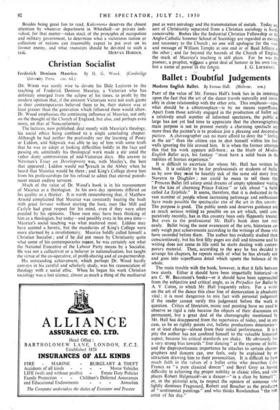Christian Socialist
Frederick Denison Maurice. By H. G. Wood. (Cambridge Univesity Frefs. ios. 6d.) DR. WOOD was surely wise to devote his Dale Lectures to the teaching of Frederick Denison Maurice, a Victorian who has definitely emerged from the eclipse of his times, to profit by the modern opinion that, if the eminent Victorians were not such giants as their contemporaries believed them to be, their stature was at least greater than the generation which followed them would allow. Dr. Wood emphasises the continuing influence of Maurice, not only on the thought of the Church of England, but also, and perhaps even more, on that of Nonconformity.
The lectures, now published, deal mostly with Maurice's theology, his social ethics being confined to.. a single concluding chapter. Although he had neither the profundity nor the learning of Pusey or Liddon, and Sidgwick was able to say of him with some truth that he was an adept at looking difficulties boldly in the face and passing on, admittedly his theological work made a stir amid the rather dusty controversies of mid-Victorian days. His answer to Newman's Essay on Development was, with Mozley's, the best that appeared ; Liddon would not 'preach in the Abbey when he heard that Maurice would be there ; and King's College drove him from his professorships for his refusal to admit that eternal punish- ment meant endless torment.
Much of the value of Dr. Wood's book is in his reassessment of Maurice as a theologian. In his own day opinions differed on his quality as a thinker. It is worth remembering that, if Matthew Arnold complained that Maurice was constantly beating the bush with great fervour without starting the hare, men like Mill and Carlyle had great respect for his mind, even if they were often puzzled by his opinions. These men may have been thinking of him as a theologian, but today—and possibly even in his own time- Maurice's social teaching was what- mattered most. Liddon may have scented a heretic, but the mandarins of King's College were more alarmed by a revolutionary. Maurice boldly called himself a Christian Socialist ; and if he did obt mean by Christianity quite what some of his contemporaries mciant, he was certainly not what the National Executive of the Labour Party means by a Socialist. He was not a collectivist or a believer in nationalisation, but taught the virtue of the co-operative, of profit-sharing and of co-partnership.
His outstanding achievement, which perhaps Dr. Wood hardly conveys in his careful and scholarly study,. was his reassociation of theology with a social ethic. When he began his work Christian sociology was a lost science, almost as much a thing of the mediaeval past as were astrology and the transmutation of metals. Today any sort of Christianity separated from a Christian sociology is barely conceivable. Bodies like the Industrial Christian Fellowship or the Anglo-Catholic Summer School of Sociology are regarded as natural and necessary to the Church ; no one will apologise for the work and message of William Temple at one end or of Basil Jellicoe at the other ; and far beyond the bounds of the Church of England the mark of Maurice's teaching is still plain. For he was the pioneer, a prophet, Silent a great deal of honour in his own time but a name of power in the future. J. G. LOCKHART.


































 Previous page
Previous page